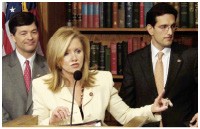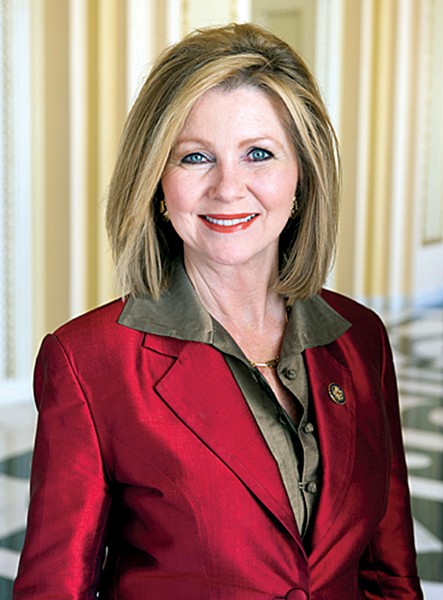Sometimes events seem to occur in reverse order, effect preceding cause or conclusions coming before the circumstances that lead to them. It’s the way that histories are written, with foreknowledge. “On the day of his fateful and fatal rendezvous with Sitting Bull, Custer set forth with 210 unsuspecting cavalry,” one might read.
But real life rarely develops like that, and the number of genuine clairvoyants among us is presumably quite small. So when Tom Leatherwood, a former back-bench state senator who has served as Shelby County register for the last 10 years, announced in March that he intended to run against one of the state’s most formidable vote-getters in recent years, 7th District congresswoman Marsha Blackburn of suburban Nashville, it seemed at first to defy common sense.
Yes, the demographic tide in Shelby County has for decades been running against Republican officeholders like Leatherwood, and Democratic challengers come closer to turning them out every time. Maybe Leatherwood would face difficulty when he’s up again two years hence. But to roll the dice now against party-mate Blackburn, an assistant GOP whip in the House and a likely candidate for governor in 2010?
Marsha Blackburn, who beat everybody in sight to get elected to Congress in 2002 and who hasn’t been seriously challenged since? Marsha Blackburn, who was comely enough at fiftysomething to be selected “the hottest woman in U.S. politics” in a widely ballyhooed Internet contest two years ago? Marsha Blackburn, who became a folk hero in conservative political circles by sending out the e-mails from her state Senate desk in 2001 that alerted a few thousand protesters, who stormed the state Capitol and stopped a compromise income-tax measure dead in its tracks?
And it’s not as if such dedication to right-wing populism is offensive to Leatherwood, who used to fulminate against TennCare as “socialized medicine” while in the Senate and, ironically enough, won an upset victory over legislative lion Leonard Dunavant in 1992 by accusing that long-term Republican incumbent of being squishy-soft on issues like the self-same income tax.
And the stories are legion in local political lore concerning the retribution visited by party establishments on upstart challengers to entrenched figures like Blackburn. One example will suffice: When city councilman Jack Sammons, a nominal Republican, had the temerity to run as an independent against GOP county-mayor nominee Jim Rout in 1994, he found himself ousted in the next council election by John Bobango, a candidate hand-picked by Rout and the local party hierarchy. Sammons had to make amends and was let back in four years later.
Two factors made Leatherwood want to take on Blackburn, he told the Flyer in March: “effectiveness and ethics.” The first count seemed fanciful, inasmuch as Leatherwood went on to blame the incumbent for not resolving such problems as the national deficit. The second count was also an eye-opener. Ethics?
Yes, Leatherwood insisted, Blackburn had a problem there. The only example he offered at the time had to do with what he said was her having taken an excessive number of “private special-interest trips.” But scarcely two weeks later came a bombshell:

Blackburn’s hard-working press secretary, Claude Chafin, began a hasty call-around to Tennessee media with the electrifying news that, over the course of the previous six years — ever since the beginning of her first race for Congress in 2002 — Blackburn had failed to report to the Federal Election Commission almost $300,000 in campaign expenditures and another $100,000 in financial contributions. Another $50,000 missing from her financial disclosures was attributed to “routine accounting errors.”
That was quite a piece of change, approaching half-a-million dollars. A reasonably modest portion of it — some $20,000 — was in unreported payments to a consulting firm operated by Mary Morgan Ketchel, Blackburn’s daughter, and Paul Ketchel, her son-in-law. Altogether, the Ketchel firm, MK Fundraising and Events, had been paid $317,623 since 2002, according to an analysis of campaign data compiled by Congressional Quarterly. And the issue was compounded by the fact that the firm itself seems to have been responsible for much of the misreporting.
For his part, Leatherwood disclaimed having possessed any clairvoyance in the matter. To be sure, he had made reference in his opening statement to Blackburn’s habit of employing family members on her office and campaign payrolls — a practice frowned upon by various private watchdog agencies like the Center for Responsive Politics.
But he seemed as surprised and taken aback as everybody else by the news of Blackburn’s omissions. “I had no idea,” he said. But he quickly adjusted, calling the revelations “phenomenal” and redoubling his emphasis on his opponent’s “ethical” failings.
In a new statement in which, as if staggered by the extent of his serendipity, he inadvertently low-balled the amount of the problem, Leatherwood tut-tutted: “While many families are struggling just to make the monthly budget in this poor economy, Congressman Blackburn has misplaced over a quarter of a million dollars. If we can’t trust her to manage her own budget, how can we trust her to manage our tax dollars?”
 Jackson Baker
Jackson Baker
Tom Leatherwood
That was a sentiment arrived at independently by Massie Ritsch, a spokesman for the Center for Responsive Politics, who noted pointedly that members of Congress were charged with balancing “the nation’s checkbook” and “should be able to balance their own.” (Ritsch also chastised the FEC itself with having handled Blackburn’s 32 separate errors piecemeal and overlooking the fact that so many trees added up to a pretty considerable forest.)
A clearly embarrassed Blackburn pointed out that the problem, which she said she’d begun to realize the extent of only in 2005 and had immediately taken steps to correct in amended reportings, had finally come to light as the result of her own admission. Leatherwood responded sardonically that she had said nothing until this year’s deadlines for candidate filing had come and gone.
Meanwhile, the GOP challenger is up against a numbers problem of his own. Through the first quarter of 2008, he reported cash receipts of only $24,480, with cash-on-hand less than $5,000, as compared to a relatively whopping $621,566 raised by Blackburn, who had cash reserved in the neighborhood of $800,000.
What that means, simply, is that, failing the explosion of another bombshell between now and the August 7th primary, Leatherwood will be hard put to make any serious headway.
“It’ll be an issue,” acknowledged Shelby County GOP chairman Bill Gianinni when first apprised of Blackburn’s reporting shortfall. That was concurred by a former chairman, Memphis lawyer John Ryder. “It doesn’t look good, and she doesn’t seem to have handled it well,” said Ryder, who went on to add, “but it’ll take a lot more than that for him [Leatherwood] to have a viable campaign.”
And Blackburn, an experienced and tireless campaigner, has availed herself of all the latest wrinkles in campaigning. In addition to the standard campaign website, she maintains a Facebook page. And besides those “town hall” meetings she has personally attended in a district which runs from the suburbs of Memphis to those of Nashville, she has conducted several electronic ones via robocall.
In the last of these that she was entitled to use federal “franking” funds for earlier this month, the incumbent Republican had another stumble of sorts. She alerted several thousand households in the district to a call-in version of the town-hall format, one in which she intended to deal with issues such as gas prices and her hard-line position on immigration. But minutes into it, a woman called in to say, “I’ve voted for you, and I really appreciate you, but I have not voted for President Bush. I feel like he is to blame for a lot of things.”
Then the caller began to dilate upon those things, which ran from “falling behind the rest of the world” to “not taking care of the people at home,” enumerating so many alleged misprisions of the Bush administration in between that the congresswoman began to protest, somewhat incongruously, “I can’t talk about political issues on this call.” She did acknowledge, as the litany of grievances went on, “Something should have been done. Yes, ma’am.”
“Just one more thing,” the woman said, appearing to wind down finally after several minutes of holding forth. “Something I learned in the fourth grade: If the country does not have more exports than imports, we’re going down the drain.” She was still going on about that when Blackburn was heard saying to an aide, “Eric, I can’t cue the system. … My computer screen is crashed. All the lines seem closed down.”
Ultimately, Blackburn had the mic to herself, announcing to whoever was still listening that, whether it was the fault of the weather or something else, she seemed to have lost communication with the folks in the district. With that, she bade a hasty farewell and told them she’d be in touch with them again soon, some other way, her cheery tone belying any possibility that the experience she’d just been through might amount to an omen.
Inasmuch as the two Democrats who have filed for Congress in the 7th District — Randy G. Morris and James Tomasik — are not only unknown quantities but unknowns, period, and since the 7th District has been in GOP hands since the election of 1972 and has been reapportioned more than once since then to make it more Republican-friendly, the burden of challenge would seem to rest on Leatherwood, as would any advantage to be gained from generalized voter discontent with things as they are.
It’s a long shot for the underfunded challenger, but it’s a shot, and, once in a while, these things pan out. Just ask a certain once obscure African-American state senator from Chicago who took a flier on a long-shot U.S. Senate race in 2004 and who, in rapid order, saw both his chief Democratic primary opponent and his Republican general-election opponent self-destruct, leaving the way to Washington wide open. He went on to make the keynote address at the 2004 Democratic National Convention, and since then — well, you know the story.






 Jackson Baker
Jackson Baker